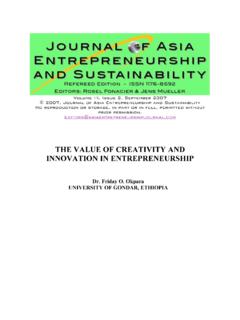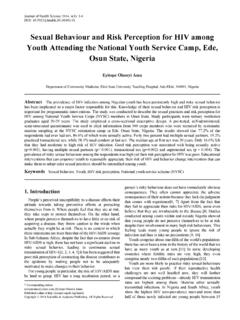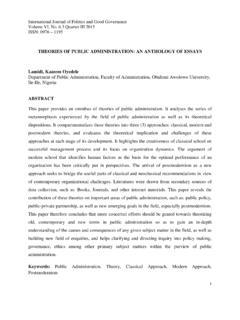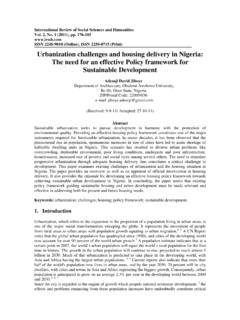Transcription of EVALUATION OF THE IMPACT OF …
1 Volume III, Issue 1. 2006, Journal of Asia Entrepreneurship and Sustainability No reproduction or storage, in part or in full, permitted without prior permission. EVALUATION OF THE IMPACT OF. ENTREPRENEURIAL CHARACTERISTICS ON. THE PERFORMANCE OF SMALL SCALE. MANUFACTURING INDUSTRIES IN NIGERIA. Adegbite, ; Ilori, ; Irefin, and Abereijo, ; Aderemi, 1. Centre for Industrial Research and Development, Obafemi Awolowo University, Ile-Ife, Nigeria. 2. Technology Planning and Development Unit, Obafemi Awolowo University, Ile-Ife, Nigeria. 3. National Centre for Technology Management, Obafemi Awolowo University, Ile-Ife, Nigeria ABSTRACT. Introduction: The research study evaluated the IMPACT of entrepreneurial characteristics on the performance of small-scale manufacturing industries in Nigeria.
2 This is with a view to identifying these entrepreneurial characteristics and the factors that influence their translation to optimum business performance. Method: Primary data, through structured questionnaire, were collected from the samples of 100 firms randomly selected from among the small-scale manufacturing industries engaged in food and beverage; textile and wearing apparel; wood and wood products;. chemical and pharmaceuticals; and fabricated metal products. Analysis: Data were analysed using descriptive and inferential statistics with the aid of Statistical Packages for Social Scientists (SPSS). Also, the correlation analysis and regression analysis were carried out to examine the relationship between contextual variables and business performance.
3 Results: The results showed that human resource factors and the sales revenue were found to be inadequate and severely inhibited the potential of the entrepreneurs for performance and growth. However, length of years in business and working experience were found to have positive contribution on their performance. While majority (7) of the 10 Personal Entrepreneurial Characteristics (PEC) of the respondents made negative contribution on the sales revenue, only demand for efficiency and product quality, information seeking; and systematic planning and monitoring had positive IMPACT . Conclusion: The study concluded that the negative attributes exhibited by the respondents in most of the PEC were critical factors in the dismal performance of the small-scale manufacturing industries, which need to be developed in the entrepreneurs through training.
4 INTRODUCTION. Perception of African entrepreneurship among scholars and researchers seem to differ considerably. At one extreme is the view that, for one reason or the other, technical entrepreneurial talent that involves the establishment and management of manufacturing industries for productive activities in the real sector of the economy, is lacking in Africa. According to a World Bank study carried out by Nils-Henrik Morch in 1995, the poor growth performance of most sub-Saharan countries and, in particular, the slow rate of industrialization could be taken to support such a dismal perception. However, the study REFEREED MATERIAL Volume III, Issue 1, 2007.
5 Journal of Asia Entrepreneurship and Sustainability further proposed an alternative view that entrepreneurial talent is indeed available but that the economic environment have been such as not to allow this talent to develop. Supporters of this view may point to the fact that the kind of economic policies that have been followed in many African countries in the two to three decades after political independence have not always been conducive to private enterprise. This position is consistent with a third view by Adjebeng-Asem (1989) that the African entrepreneur is alive and well, but that he or she, rather than undertaking manufacturing businesses, has been diverted to non-productive, rent-seeking activities which researchers have referred to as commercial entrepreneurship.
6 In spite of this critical gap in Africa's development process, researchers and scholars around the world have long identified the role of entrepreneurs and entrepreneurship in the economic development of nations. For instance, Dozie (2005) argues that this vital factor of production formed the bedrock of the classical thesis of Joseph Schumpeter (1934) who established that no nation would break the barriers of development without a critical mass of entrepreneurs. This assertion, which formed the basis of Schumpeterian model of economic growth, has helped many developed and even developing nations to accelerate their pace of development by focusing on appropriate incentives to support entrepreneurial activity (Dozie, 2005).
7 It is the entrepreneurs who generate the critical momentum an economy requires for economic growth by breaking new grounds in human endeavour as a result of the vital characteristics or attributes they posses. Unfortunately, after more than four decades of import substitution strategy, structural adjustment programme (SAP), commercialization and privatization of ailing state-owned enterprises and general economic decline, the manufacturing sector's contribution to the Gross Domestic Product (GDP) in Nigeria is still very small. It is plagued by low productivity and low-quality output. This is compounded by the consequent increase in competition from imports, which has resulted in downsizing or outright closure of many manufacturing industries.
8 Therefore, the extent to which the restructuring of the private sector as the engine of growth of the economy will succeed is dependent on the fostering and development of technical entrepreneurship among the indigenous population. In addition, theoretical and empirical investigations have emphasized the crucial role that technological innovation and technical entrepreneurship play in fostering economic development. These investigations are now seen as crucial and are also recognized as important components of technology policy and economic planning. For instance, the present emphasis by government and stakeholders on indigenous technical innovation and entrepreneurship stems from the failure of past attempts through the import substitution strategy to stimulate development by borrowing or transferring advanced and sometimes inappropriate and unsustainable technologies from developed countries.
9 This position was further reinforced by Adjebeng-Asem (1989) where it was argued that governments in most developing economies such as Nigeria were criticized for paying REFEREED MATERIAL Volume III, Issue 1, 2007. Journal of Asia Entrepreneurship and Sustainability inadequate attention to the need for accelerated economic growth and for not harnessing the abilities of their own citizens for technological innovations and entrepreneurship. Critics also conclude that these developing countries depend on exogenous technologies that are inappropriate for their environment (ibid, 1989). This has been responsible for Nigeria's exports which have largely been based on raw materials and semi-manufactured goods with the petroleum sector as the most important.
10 Less than 5% of these exports are on the average attached to knowledge intensive goods and services (Adjebeng-Asem, 1989 and Akeredolu-Ale, 1975). The problems became acute in the 1980's and early 1990's, when Nigeria experienced stagnating industrial output and decreasing crude oil prices while industrialization through the production of indigenous technological development became central topics in the industrial policy debates. As a result of this, United Nations Development Programme (UNDP, 1992) and United Nations Industrial Development Organisation (UNIDO, 1994) argued that if Nigeria is to join the league of industrialized economies, industrial activities have to converge and focus more on knowledge-based production particularly in the small scale manufacturing and processing industries.







